You may not have noticed. Local media have done their best to throttle the story. But the perennially boring Bluegrass is home to one of the year’s more interesting political races: Kentucky’s 6th congressional district, a territory centered on Lexington that includes most of the counties comprising the inner Bluegrass, where Republican Congressman Andy Barr will be challenged by the Democrat Geoff Young. While the incumbent Barr is a fairly standard brand of country-club Republican who has represented Lexington’s 6th district since 2013, the same cannot be said of his challenger.
Since the early Obama years, Geoff Young has run a series of underfunded outsider campaigns for Governor and KY 6 Congressman, none of which have ever made it beyond the primaries. These campaigns have featured an unapologetic platform of now-standard progressive bailiwicks like green economies, medicare-for-all, workplace empowerment, marijuana legalization, gender equality, voting reform and all that other progressive shit that Bernie Sanders would later popularize in his 2016 presidential campaign.
By far, though, Geoff Young’s campaigns have most strongly espoused an anti-war and anti-corruption politics that transgresses party lines.
This unyielding focus has virtually ensured a long-term sneering treatment by area media, who often present Young’s views as less-than-newsworthy or residing outside of legitimate mainstream discourse, usually with the help of political insiders from both state parties, who have dismissed Young as mentally unstable.
In previous primaries, Young’s kind of politics have only broke 5% support once, when he garnered 19% in 2016’s KY 6 Democrat primary against Nancy Jo Kemper. (Kemper went on to be throttled by Barr in the general election, 61-39%. ) This year, however, things changed. Young won the KY 6 Democrat nomination with 51.7% of the vote, winning every single county outside of Lexington’s Fayette Urban county. Politically speaking, this transformation is holy crap! territory.
The party line, sneering at us from the j-school quills of KDP house-organ the Lexington Herald Leader, has been that Young’s victory was a no-story fluke. Young beat a historically bad opponent in the Democrat primaries, and he will be slaughtered in November when he runs against Andy Barr.
This nothing-to-see-here story-line may prove true, but it seems insufficient at the moment.
For one, politics aside, Young’s story is a refreshing tale of a truly committed citizen finally getting a chance. Despite a decade of primary losses, despite numerous obstacles hauled down upon him by the slow-footed dotards who occupy Kentucky’s political high-grounds, despite little outside financial donations, despite marginal support from Lexington’s “activist” class, and despite a host of other headwinds, Young kept plugging away until, finally, he won one for once. Just like that ol’ song by Lexington’s own Otto Helmuth.
But even if you’re turned off by Young’s civic journey or Otto’s wordsmithing, the KY 6 race shines a spotlight on several intriguing state and national story lines. Young is a walking fault-line of political pressure-points within both the Democrat and Republican parties. We can only ignore them for so long.
At the moment, KY 6 is home to a Democrat candidate who exudes old-school Bush-era anti-war cred amidst his party’s national drift into World War 3. Who has for a decade been running on the rightly-celebrated Charles Booker platform. Who has won rural Democrat votes in a state that has been shedding them for years. Who has been explicitly condemned by his party’s institutional apparatus, including the Democrat Governor, UK College Democrats, the future Louisville District 3 Congressman, the Fayette County Democrats, and others.
Geoff Sebesta: KY 6 Field Marshal
These interlocked KY 6 fault lines seem sufficiently interesting for us to seek out Geoff Sebesta, who has referred to himself as Geoff Young’s field director. Upstart campaigns have a knack for introducing the public to interesting characters with unique political insights, and Sebesta is certainly one of those interesting characters.
An artist and comic book author, Sebesta is like Young a full-time engaged citizen. The Winchester native moved back to the area in 2017 and immediately began throwing himself into local and state campaigns, even running for Secretary of State in 2019. His is the kind of committed support that all campaigns and polities need to thrive.
Since 2018, Sebesta has partnered with Young on his outsider campaigns. Last spring, in the run-up to the primary won by Young, you probably saw some of his political art while purchasing your bourbon at the northside Liquor Barn Express.
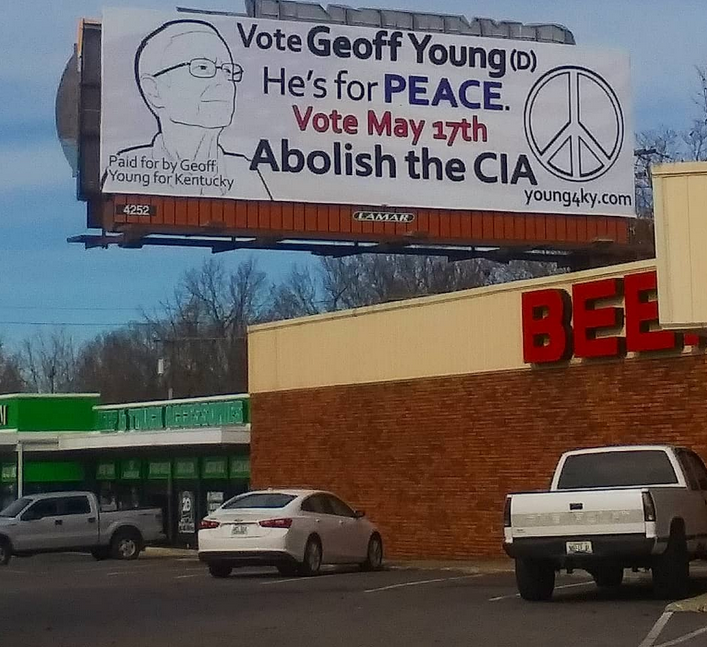
In researching Geoff’s background for this story, I kept coming back to a 2011 image from Cloudhopper, the on-again, off-again comic series that Sebesta has created. The picture encapsulates much of the ethos of Young’s 2022 campaign. In the Cloudhopper narrative, a guy and girl dine at a high-end restaurant and then give a bullshit excuse for not paying. The waiter is outraged.
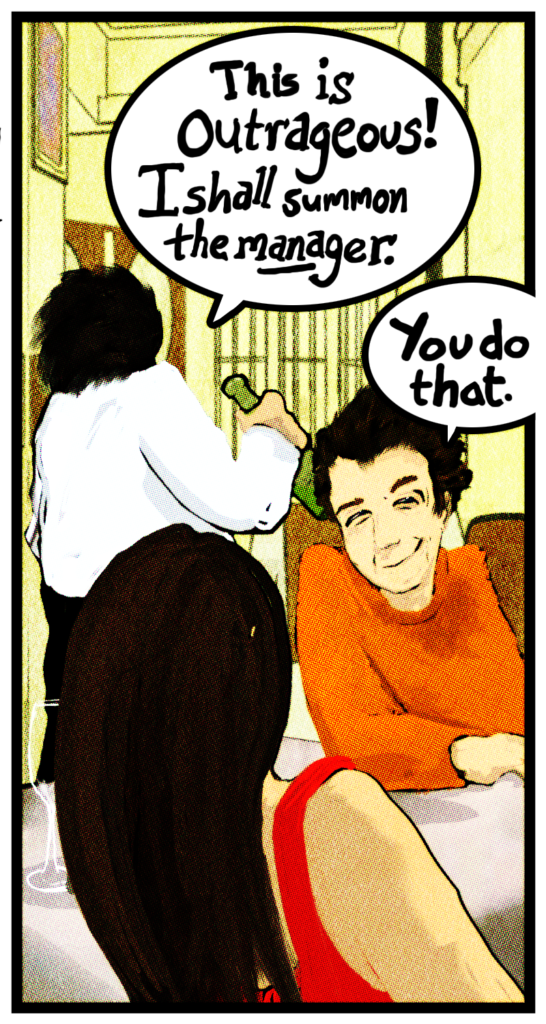
In our restaurant-forward city, the image may not play well. (Relax, it’s art!) But in the waiter’s aghastitude, his fleeing appeal for some higher Authority, the confident “You do that” brushoff from the couple who already drank that wine, thanks very much…there’s a certain moxie, a barbarians amassing at the gates vibe that seems to describe this year’s KY 6 race.
Normally, Democrat-based truth-tellers like Young get rooted out in the primaries by a lack of serious media attention and access to other capital. This is particularly true in a place like Lexington, which is socially dominated by people who express a particular class-bred revulsion for barbarians. There is a reason, after all, why country club Republican Andy Barr has thrived in Kentucky’s second largest city, home to the University of Kentucky. But given Young’s improbable primary victory, it seems worthwhile to listen to what these anti-war bluegrass barbarians, these Sixth district losers who gonna roll tonight, have to say.
In Part 1 of NoC’s interview with Geoff Sebesta, we take the opportunity to discuss New York City graffiti art, Kentucky Attorney General Michael Adams, the joy of running for office, and, of course, billboard design with Geoff Young.
Danny Mayer, editor
***
NoC: You took part in the 2011 Occupy movement, setting up shop at Occupy Austin in Texas. You wrote at the time,
People want a lot from the Occupy movement. First they wanted to not have to pay attention, and now they want a list of demands, as if Occupy were holding them hostage. A[t] Occupy Austin, people really don’t know what they want. Are they even protesting?
Out here we’re meeting to talk, to show support, to trade ideas, to change minds, to have fun waving signs. All signs welcome — I saw Lyndon LaRouche types one day, communists the next, Infowars the third. We’re reclaiming our public spaces.You always said you wanted us to turn off the TV and go outside. This is what it looks like.
What’s your assessment of Occupy now, nearly twelve years later?
Geoff Sebesta: I was more part of a group that Occupy Austin came from. I’m of that dreadful species of hippie who found a beautiful hippie woman, got married, had kids, and became much less hard-core. Occupy happened right when I was in the process of going indoors, so I didn’t get involved the way I could have.
It’s obvious in retrospect that Obama crushed Occupy and that drove liberalism mad. Being forced to carry the weight of having the peaceful revolution consciously destroyed by the person chosen to lead it…not many groups can withstand something like that. It divided liberalism into “people who will believe anything” and “people who will believe nothing.”
It’s funny that “LaRouche, communists, and Infowars” is a fairly good description of a large part of Geoff Young’s current fanbase.
NoC: How did you end up in Lexington?
GS: I’m from Winchester. Moved back in 2017 so my kids could get to know their grandparents and great-grandparents.

NoC: You’ve developed a number of serial comics, which technically makes you a Lexington comic book artist. Do you have any favorite local artists working in that medium?
GS: I’m a huge fan of my wife Gewel Kafka’s work, and I have some friends whose work I enjoy, and I see some murals and some sculpture that I like a lot, but I don’t really know anybody. I’m a comic book artist because of New York City, New Jersey, California, and Austin. Not Kentucky. Kentucky has had extremely little interest in my comics work, preferring instead that I work in politics, horse sports (deeply related fields on so many levels), and, for some reason, as a bassist in a rock band.
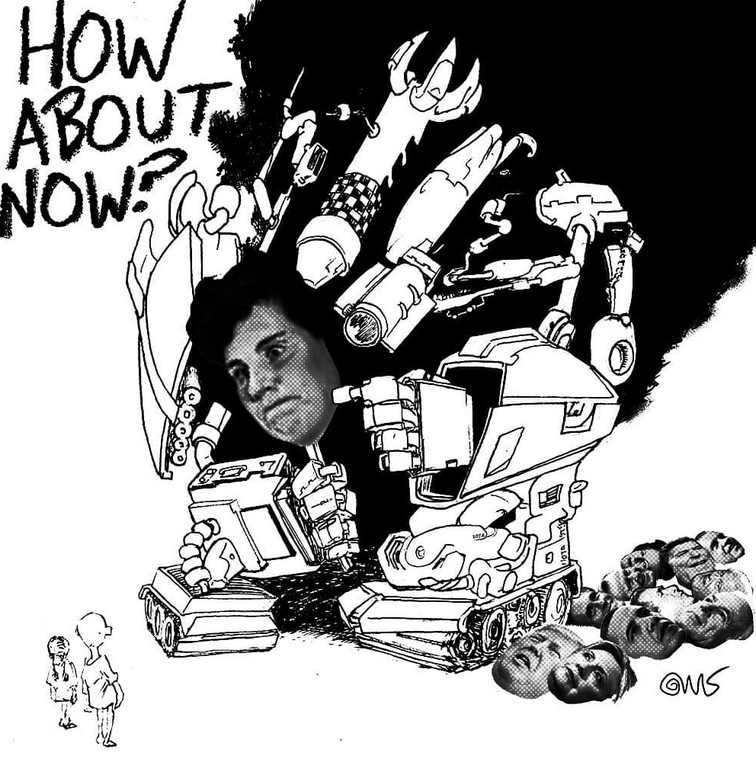
I don’t mind. I wasn’t always a professional artist. It certainly wasn’t anything I intended to do when I was young. If life wants to take me someplace new and strange, at least I’ll know how to draw when I get there.
NoC: Some of your work operates in the same spirit as the Lower East Side comic book artist Seth Tobacman.
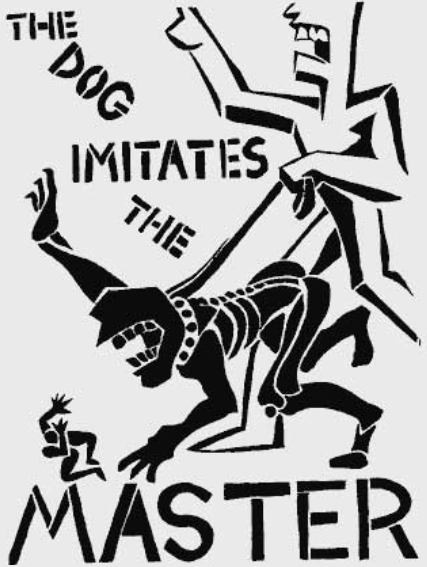
Does that seem far-fetched?
GS: Yeah, Seth is great. He and Eric Drooker were very interesting to me back when I was doing a lot of graffiti and using a lot of stencils. I think we come from similar places, as I spent a lot of time in NYC as a youth and was entranced with the graffiti. Those tag-covered trains were something else. Keith Haring was EVERYWHERE — I still remember how shocked I was when I realized that Keith Haring was a single guy. I thought it was a team of people — it had to be! But nope, one guy who worked hard.
NoC: How did you get hooked up with Geoff Young?
GS: I had just moved to Lexington. I was on Reddit trying to find some place to plug in, and somebody said, “Well whatever you do, don’t work with Geoff Young.” And I was like, Why not? And they were like, Because he believes this, this, and that.
But those were all things I believed.
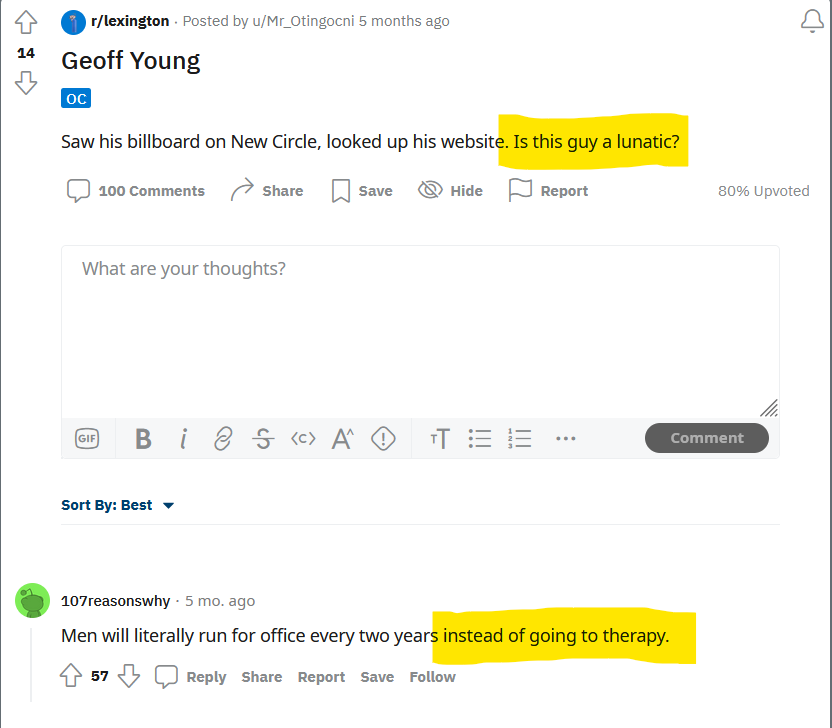
Pacifism and deeply committed anti-war politics can be difficult to understand. Many people just don’t get it. It fundamentally does not scan. All those randos on Reddit were freaking out about hardcore left Chomskyism.
They were also angry about the lawsuits. But I never had a problem with them; I understand, and celebrate, the role of lawsuits in American political life. Just because the citizen lawsuit has fallen out of style does not mean that the citizen lawsuit should have fallen out of style.
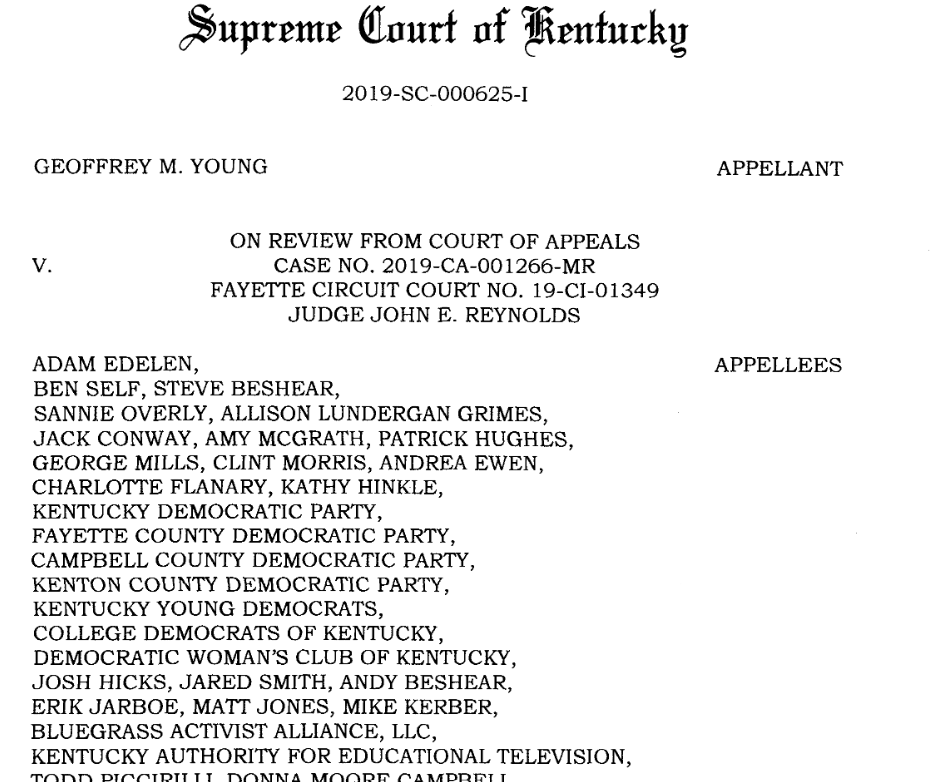
Legal issues should be solved, when necessary, with lawsuits. It is therefore essential for the law to remain within reach of the average citizen and lawsuits to remain fileable by people who are not lawyers. I do not want lawyers to become a new American priest class. The law must remain comprehensible to, and useful to, the average American.
NoC: This was 2017?
GS: This was 2017. I was still hurting pretty bad from the way that the Democratic Party stole the primary from Bernie Sanders, robbing him of even the right to defend himself in a court of law. So I was like, “Cool, more people should be suing the Democratic party.” It just so happened that I went to a Thanksgiving potluck with the Lexington Friends, which is the Quaker group of Lexington.

Young showed up, because he attends that church regularly. We got to talking and I told him that I wanted to work on something, but at the time I was very serious about only working on local things. He introduced me to a third friend of ours, a guy named Trey Alexander. Trey was running for state legislature, and I was going to work on Trey’s campaign.

We got some good structure and groundwork together, but the thing ran afoul of deadlines and filing laws, as so many political campaigns do. Geoff’s did not. So when the filing deadline closed, which I believe was in January of 2018, there was only Geoff’s campaign to work on. So I started working with him. It was immediately vastly entertaining.
NoC: In 2019, you ran for Kentucky Secretary of State as a Democrat and lost in the primaries. How was that experience? Why Secretary of State?
GS: Oh, it was great fun! Nobody expected it to be that much fun. That was one of the moments that was extremely transformative. People knew who I was because of my association with Young and were expecting me to be some sort of ogre.
I was never going to win a popularity contest against Miss America [Democrat candidate Heather French Henry]. So I just decided to have fun with it and try to mention felon re-enfranchisement as often as I possibly could, which turned out to be every single time I gave a speech.
NoC: What is your assessment of the work of the Republican who ultimately won that race, Michael Adams?
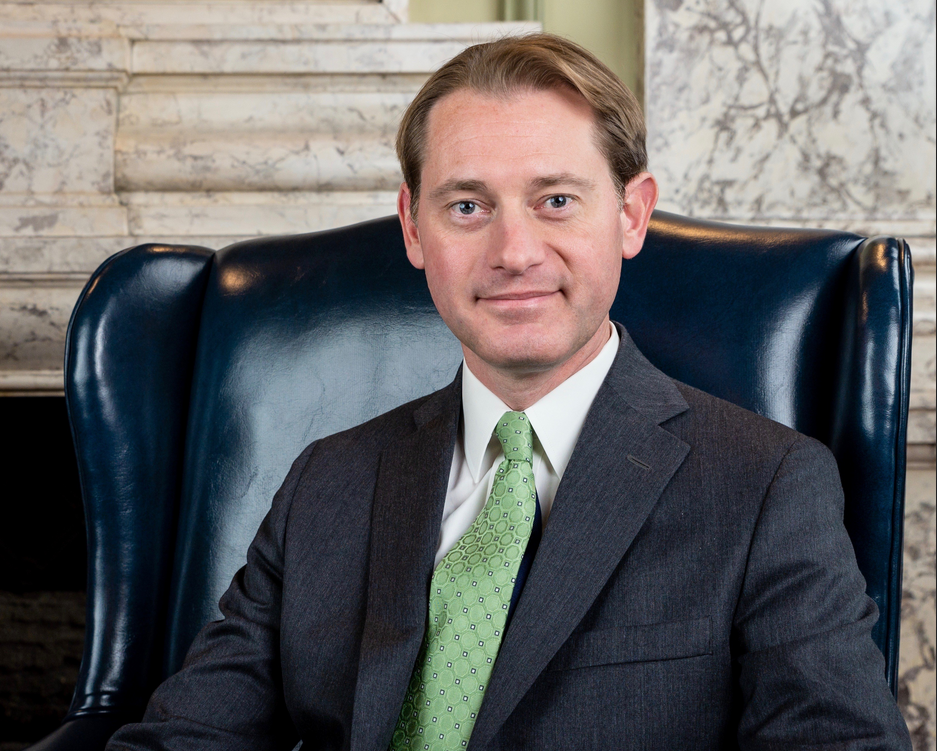
GS: I thought Michael Adams’s campaign against Heather French Henry was petty and small, but his behavior in office has been above reproach. I’m actually a huge fan and probably won’t be sad at all if he’s re-elected.
I have a couple arguments with things he’s done. Why is precinct-by-precinct data no longer available on the state level? Why so grumpy about recounts when that’s the job that you are paid hundreds of thousands of dollars to do? But on the whole, A+ performance, extremely decent and non-partisan. I’m not sure I’d have done a better job if I had won, though obviously I’d have been far more entertaining.
NoC: On your web-site Radio Free North Hollywood, you describe a 2018 electioneering visit with Young to meet with a group of area labor union heads. This was during Young’s failed primary campaign against Amy McGrath. You wrote that Young gave
…one of the strangest and least appropriate speeches I have ever seen. Mr. Young’s misreading of the audience was so tremendous as to approach brilliance. After devoting precisely one sentence, the first, to his belief that unions are the foundation of the middle class, he launched directly into a 15-minute indictment of America’s colonial empire since the Vietnam era. He went from Clinton to Bush to Obama to Trump, in great detail, clearly outlining their history of war crimes and violence.
You left that meeting impressed with Young as a serious, no-nonsense politician. Why was that?
GS: Because there is nothing in this world more important than getting the American military-industrial complex under control, and the fact that 99% of America doesn’t want to hear about it doesn’t mean they don’t have to hear about it. Everybody needs to hear about it. America needs to come to terms with what we have done in foreign nations, if for no other reason than maybe it will stop us from doing it again.

In the limited sense of “winning” at local politics it was not a rational decision to tell the Kroger’s union about America’s legacy in Libya, but in the larger sense there is nothing more important. Young is not crazy for presenting it; they are crazy for not wanting to hear it.
I came back to Kentucky with exactly zero interest in participating in anything even vaguely related to national politics. I wanted to find people who didn’t have the political capacity to disappoint me, basically. Young was the one who demonstrated that there was a way to affect the national scene that I had never even considered. It was possible to remain in the Democratic Party and to uphold all the necessary functions of a politician while still telling the truth and talking about what really matters.
NoC: Four years later, you have been listed as the field director for Young, who recently secured the Democrat nomination to run against the Republican Andy Barr.
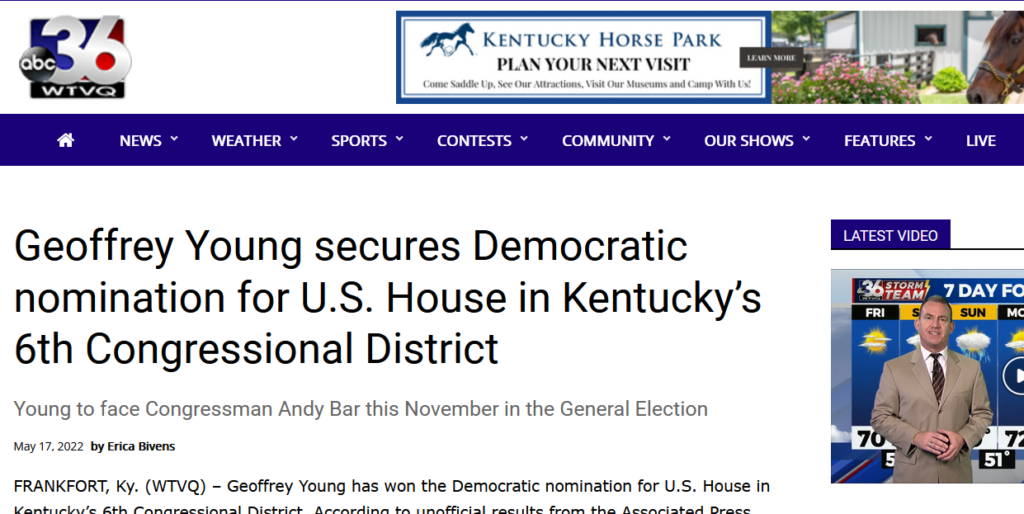
What exactly is your role in the campaign?
GS: I think it’s fairly well known that I’m Young’s political partner and have been for years. I’ve worked on all his campaigns since 2018 in some capacity or another and will probably work on future campaigns, though I’m hoping he wins this time and we can rest for a bit.
There’s little difference between Young’s politics and mine, but that’s not what I get out of it; what Young’s selling is basically a hard-nosed Chomsky/Carter fusion, which is what most of Gen X wants. It’s harder to disagree with what he’s saying than to agree with it, since nine-tenths of it is just basic common-sense Democratic policy.
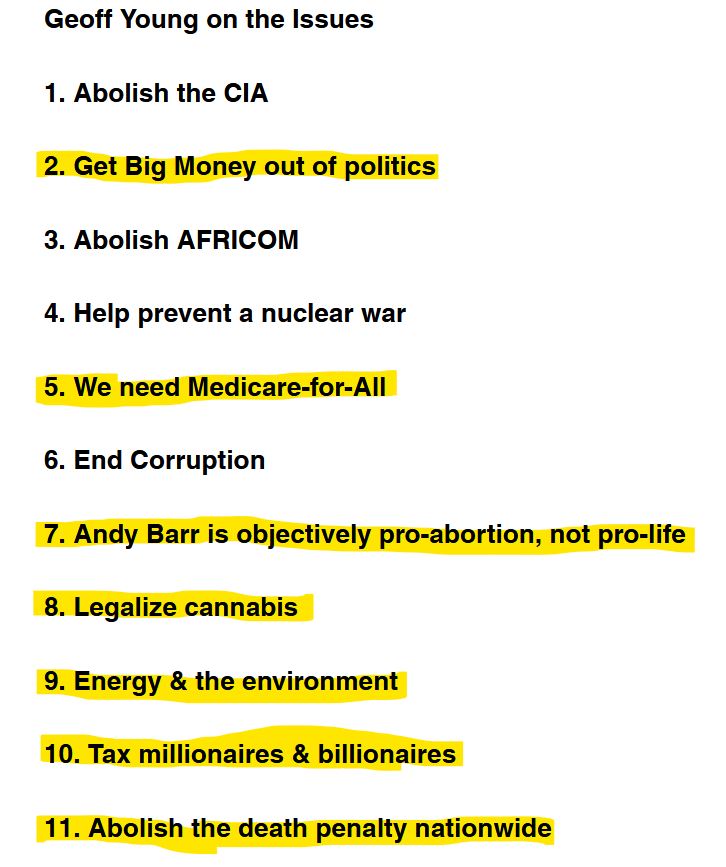
As to my role in the campaign, when it comes to politics the Geoffs (Young and Sebesta) have an excellent collaboration that seems more rooted in creative endeavor than normal politics. I consider the campaign to be a shared creation and the Geoff Young that voters know to be a sort of cartoon of the real person. I see Geoff Young much like the lead singer and songwriter of the band we’re in, and I’m the rhythm section. He isn’t exactly as people believe him to be, and that’s fine; his job is to project this character in a way the voters can understand.
I’m not in charge and I’m not just following orders either — I’m like the drummer or the bassist. There’s a clear separation of the spheres in Young’s interests and mine — I’m far more into Kentucky politics than he is. He’s focused on foreign policy in a way that very few living humans are.
NoC: The defining image of the primary election had to be Young’s billboard on Lexington’s North New Circle Road, which stood next to the Liquor Barn Express.

Did you help compose the billboard’s (dare we say, iconic?) cartoon image of Young, which also featured in his primary mailer? The face complementing the simple message, Abolish the CIA. There’s something King of the Hill about the whole arrangement. It seems designed to appeal to rural voters. Was that intentional?
GS: Yeah, I drew that cartoon. That was his message. Any time something is extremely direct you can be fairly sure it came from Geoff Y. instead of Geoff S. Messaging generally rests with Geoff Young.
Nothing about Geoff Young’s political presence is meant to “appeal” to anyone, it’s meant to encapsulate the truth as succinctly as possible and deliver it as provocatively as possible. He is trying to provoke people; that’s not anybody’s imagination, that is actually happening. I will sometimes change a message to make it less provocative and he will change it back.
NoC: Young’s primary victory was pretty remarkable. In seven previous runs for office, only once (2014’s District 6 Democrat Primary) did Young secure 40% of the primary vote. Mainly he’s gotten between 2% and 20%. Beyond the iconic billboard beneath the northside Liquor Barn, what changed in this election cycle?
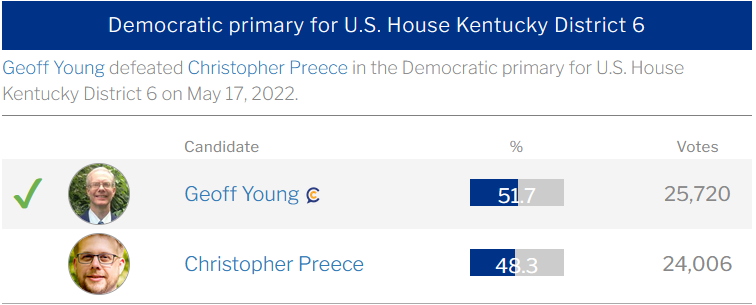
GS: Well, this is the first election cycle that the Kentucky Democratic Party did not overtly try to influence the primary. Young has long contended that from 2014 to 2019 the KDP rigged elections against him.
When the new group came into power in the KDP, they stopped trying to influence the primary, and Young immediately won. Whether anybody likes it or not, those are the facts.
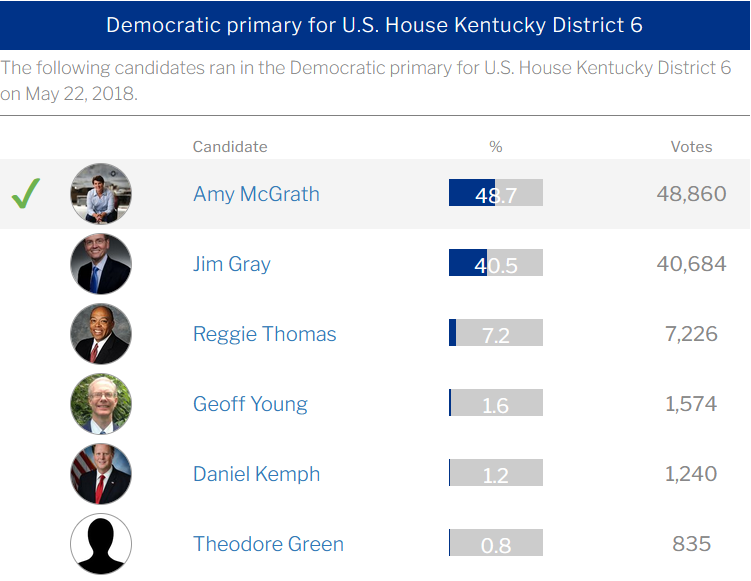
NoC: What about Ukraine?
GS: Coming out strong against the NATO proxy war in Ukraine helped a lot.
I think people deeply underestimate just how anti-war Kentucky is. This is an extremely military state, with a huge number of soldiers in every American military conflict. That also means this state has a lot of dead sons and daughters. This state has suffered disproportionately in every war. Every child that America turns into a soldier also turns a whole bunch of family members into unhappy people who don’t want to hurt anyone’s feelings but know deep down that something’s wrong, and after the last eighty years that grumbling has turned into a roar.
I’d say about one out of four doors in Kentucky has somebody living behind it who is deeply aware of what the American empire has cost us, and that’s not just in Lexington or Louisville. It’s actually more intense in the rural areas. Rural Kentucky has suffered terribly in the last few decades. Intergalactic sums of money to turn Ukraine into a crater does not sound good to us, especially when we can’t afford enough food to eat or the gas to go buy it.
*** *** ***
In part 2 of this interview, Sebesta discusses the KDP and Keeneland Liberals, winning rural voters, and why switching political parties can be a good thing.



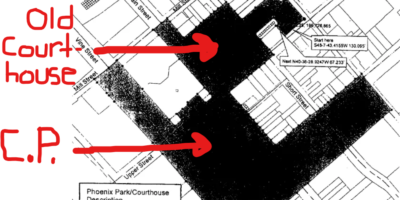
Barry Saturday
I REALLY didn’t want to read this article. It was bizarrely entertaining, and definitely something original; I might call it psychedelic political journalism. Nice work, Danny.
Geoff Young
The phrase “psychedelic political journalism” reminds me of Hunter S. Thompson, Barry.
https://en.wikipedia.org/wiki/History_of_Louisville,_Kentucky
What did you think of Part 2?
Geoff Young
Wonderful article!
When can I talk with you all?
Geoff Young